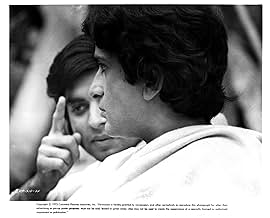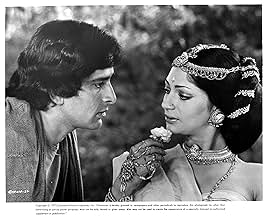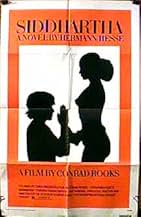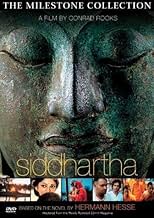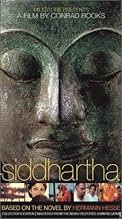IMDb-BEWERTUNG
6,6/10
1338
IHRE BEWERTUNG
Füge eine Handlung in deiner Sprache hinzuThe story of a young Indian who embarks upon a journey to find the meaning of existence. Based on the novel by Hermann Hesse.The story of a young Indian who embarks upon a journey to find the meaning of existence. Based on the novel by Hermann Hesse.The story of a young Indian who embarks upon a journey to find the meaning of existence. Based on the novel by Hermann Hesse.
Empfohlene Bewertungen
If you loved the book by Hermann Hesse, you will most likely love this film. At times, it seems rather disjointed - almost as though I had blinked and missed a scene. I really consider this film to be a great companion to a great book. I am curious to know what people who had not read the book would think of this film.
No movie that is even marginally true to the story that Nobel Prize-winning German author Hermann Hesse told in his novel Siddhartha (1951) is without merit; and this modest film is no exception. The problem is, that while Conrad Brooks, who wrote, directed and produced the film, is true to the storyline of the novel and even in some respects true to the spirit of the novel, he fails to bring the power and the resplendence of Hesse's philosophic and spiritual masterpiece to the screen.
What made the novel one of the best ever written is the character of Siddhartha himself. Patterned after the Buddha both in temperament and in experience, Hesse's Siddhartha, "the Accomplished One," grew up amid extravagant wealth and privilege only to dump it all in an effort to find himself. Brooks fails almost immediately when he leaves out the scene from the book in which the young Siddhartha, not wanting to directly disobey his father (and to demonstrate his resolve) stands up all night waiting patiently for his father's permission to leave their splendid estates. This is one of the great "coming of age" scenes ever written and an early insight into Siddhartha's strength of character, but Brooks gives it barely a notice! Also skirted over too quickly are Siddhartha's years with the samanas in the forest where he practiced meditation and austerities. This part of Siddhartha's life was essential in making him the man he was and in showing us his character. He spent six years with the shamans and gurus of the forest (along with his companion Govinda) and in the end learned everything they knew and more, and yet had not found the answer he sought. (This parallels the experience of the "emaciated" Buddha.) Brooks does do the meeting with the Buddha well, having us hear his voice but not see him, and then follows that up with Siddhartha's reasons for not following the Buddha, even though he finds no fault with the Enlightened One's teachings. Note that without his actually meeting the Buddha, the life of Siddhartha (which is one of the traditional names of the Buddha) would so closely parallel that of the Buddha that some people might think that Hesse had written a profane life of the Buddha, which might not set well with some Buddhists! (Of course we all have the Buddha nature.) Siddhartha's life with the courtesan Kamala and the merchant Kamaswami and his spiral into debauchery and sloth is well depicted, although again the ultimate disillusionment that Siddhartha experienced is not as well presented as in the novel. Which brings me to Shashi Kapoor who plays Siddhartha. Although he would go on to be the veteran of well over a hundred films, and although he is appropriately enough Indian as well as tall, dark and handsome and a good actor, he fails to evoke the passion that Siddhartha must have. Siddhartha felt everything in a profound manner, even boredom was profoundly experienced by the Brahmin's prodigal son. Kapoor, especially near the end of the film when he plays an old man, occasionally made me feel that he could be "the Accomplished One," but more often he made me feel that he was holding something back.
Finally, the poetic scene near the end of the novel when, after living with and being guided by Vasudeva, the ferryman, Siddhartha becomes one with the river and falls spiritually into its wisdom, is only a bland shadow of what appears in the novel! Part of the reason for the failure probably has to do with a limited budget. The film is 83 minutes long, but could easily be twice that long. Part has to do with the selection of scenes and the emphasis on those scenes, and finally part of the reason has to do with the relative inexperience of Brooks who was only directing his second major film (and apparently his last). Certainly the on-location in India cinematography by Sven Nykvist who worked on so many films with Ingmar Berman is not to be faulted. Although not spectacular, Nykvist's camera conveys both the exotic beauty and the poverty of a landscape that could have been India 26 centuries ago.
(Note: Over 500 of my movie reviews are now available in my book "Cut to the Chaise Lounge or I Can't Believe I Swallowed the Remote!" Get it at Amazon!)
What made the novel one of the best ever written is the character of Siddhartha himself. Patterned after the Buddha both in temperament and in experience, Hesse's Siddhartha, "the Accomplished One," grew up amid extravagant wealth and privilege only to dump it all in an effort to find himself. Brooks fails almost immediately when he leaves out the scene from the book in which the young Siddhartha, not wanting to directly disobey his father (and to demonstrate his resolve) stands up all night waiting patiently for his father's permission to leave their splendid estates. This is one of the great "coming of age" scenes ever written and an early insight into Siddhartha's strength of character, but Brooks gives it barely a notice! Also skirted over too quickly are Siddhartha's years with the samanas in the forest where he practiced meditation and austerities. This part of Siddhartha's life was essential in making him the man he was and in showing us his character. He spent six years with the shamans and gurus of the forest (along with his companion Govinda) and in the end learned everything they knew and more, and yet had not found the answer he sought. (This parallels the experience of the "emaciated" Buddha.) Brooks does do the meeting with the Buddha well, having us hear his voice but not see him, and then follows that up with Siddhartha's reasons for not following the Buddha, even though he finds no fault with the Enlightened One's teachings. Note that without his actually meeting the Buddha, the life of Siddhartha (which is one of the traditional names of the Buddha) would so closely parallel that of the Buddha that some people might think that Hesse had written a profane life of the Buddha, which might not set well with some Buddhists! (Of course we all have the Buddha nature.) Siddhartha's life with the courtesan Kamala and the merchant Kamaswami and his spiral into debauchery and sloth is well depicted, although again the ultimate disillusionment that Siddhartha experienced is not as well presented as in the novel. Which brings me to Shashi Kapoor who plays Siddhartha. Although he would go on to be the veteran of well over a hundred films, and although he is appropriately enough Indian as well as tall, dark and handsome and a good actor, he fails to evoke the passion that Siddhartha must have. Siddhartha felt everything in a profound manner, even boredom was profoundly experienced by the Brahmin's prodigal son. Kapoor, especially near the end of the film when he plays an old man, occasionally made me feel that he could be "the Accomplished One," but more often he made me feel that he was holding something back.
Finally, the poetic scene near the end of the novel when, after living with and being guided by Vasudeva, the ferryman, Siddhartha becomes one with the river and falls spiritually into its wisdom, is only a bland shadow of what appears in the novel! Part of the reason for the failure probably has to do with a limited budget. The film is 83 minutes long, but could easily be twice that long. Part has to do with the selection of scenes and the emphasis on those scenes, and finally part of the reason has to do with the relative inexperience of Brooks who was only directing his second major film (and apparently his last). Certainly the on-location in India cinematography by Sven Nykvist who worked on so many films with Ingmar Berman is not to be faulted. Although not spectacular, Nykvist's camera conveys both the exotic beauty and the poverty of a landscape that could have been India 26 centuries ago.
(Note: Over 500 of my movie reviews are now available in my book "Cut to the Chaise Lounge or I Can't Believe I Swallowed the Remote!" Get it at Amazon!)
After seeing this movie again in New York recently and noticing that it was going to be available on DVD, I ordered it immediately through Amazon.com and decided to send the following comments, which were posted in the "customer reviews" section:
1. The plot. The Nobel Prize winner, Hermann Hesse, wrote Siddhartha in 1922. It is a novel about Eastern spirituality (many Indian scholars consider it as one of the few successful examples of Indian philosophy presented by a Western author). Siddhartha is one of the names given to the Buddha himself. The novel narrates the pilgrimage of the son of a Brahmin, his struggle to find his own destiny; his friendship with Govinda (his "shadow"); his encounters with many different people: the Samanas (the ascetics that practice self-denial); Kamala (a courtesan who claims that she can teach and provide love as an art); Kamasawami (a rich merchant who becomes his boss); and Vasudeva... - note Vasudeva is another name given to Krishna, the teacher/driver of Arjuna in the Bhagavad-Gita).
2. The Movie. In 1972, Conrad Rooks (an almost unknown movie director who made "Chappaqua" in 1966) came out with a 94-minute movie transcription of Hesse's novel. He engaged Sven Nykvist (the famous Swedish cinematographer of Igmar Bergman) and a mainly Indian cast, including Shashi Kapoor (Siddhartha), Simi Garewal (Kamala), Romesh Sharma (Govinda) and Zul Vellani (Vasudeva). The beautiful music was composed by Hemanta Mukherjee (I hope the soundtrack will be available soon). It will be particularly enjoyable for those who have read the book. In many of the scenes the synergism produced by the photography, the music and the acting is superb. And with few exceptions, the movie is a good transcription of the book. The book and the movie became part of the "cult culture" of the West coast of the early seventies, but it never got the attention of the general public. With a condescending tone, Leonard Maltin refers to the movie as "too arty, but on-location photography ... is often dazzling".
After seeing the DVD transfer I was very happy with its high quality. There are 27 interesting minutes of comments made by Conrad Rooks about why and how he made the movie 30 years ago. With the DVD technology I am able to enjoy my favorite scenes and particularly the music of Hemanta Mukherjee on texts from another Nobel Prize, Rabindranath Tagore. Because of these unforgettable moments, I give a rating of 10, absolving Rooks from his "youth sins".
1. The plot. The Nobel Prize winner, Hermann Hesse, wrote Siddhartha in 1922. It is a novel about Eastern spirituality (many Indian scholars consider it as one of the few successful examples of Indian philosophy presented by a Western author). Siddhartha is one of the names given to the Buddha himself. The novel narrates the pilgrimage of the son of a Brahmin, his struggle to find his own destiny; his friendship with Govinda (his "shadow"); his encounters with many different people: the Samanas (the ascetics that practice self-denial); Kamala (a courtesan who claims that she can teach and provide love as an art); Kamasawami (a rich merchant who becomes his boss); and Vasudeva... - note Vasudeva is another name given to Krishna, the teacher/driver of Arjuna in the Bhagavad-Gita).
2. The Movie. In 1972, Conrad Rooks (an almost unknown movie director who made "Chappaqua" in 1966) came out with a 94-minute movie transcription of Hesse's novel. He engaged Sven Nykvist (the famous Swedish cinematographer of Igmar Bergman) and a mainly Indian cast, including Shashi Kapoor (Siddhartha), Simi Garewal (Kamala), Romesh Sharma (Govinda) and Zul Vellani (Vasudeva). The beautiful music was composed by Hemanta Mukherjee (I hope the soundtrack will be available soon). It will be particularly enjoyable for those who have read the book. In many of the scenes the synergism produced by the photography, the music and the acting is superb. And with few exceptions, the movie is a good transcription of the book. The book and the movie became part of the "cult culture" of the West coast of the early seventies, but it never got the attention of the general public. With a condescending tone, Leonard Maltin refers to the movie as "too arty, but on-location photography ... is often dazzling".
After seeing the DVD transfer I was very happy with its high quality. There are 27 interesting minutes of comments made by Conrad Rooks about why and how he made the movie 30 years ago. With the DVD technology I am able to enjoy my favorite scenes and particularly the music of Hemanta Mukherjee on texts from another Nobel Prize, Rabindranath Tagore. Because of these unforgettable moments, I give a rating of 10, absolving Rooks from his "youth sins".
This is much smoother but less interesting than Conrad Rooks' other earlier and more cultish film, his drug autobiography `Chappaqua' (1966), which has cameos by Allen Ginzburg, William Burroughs, and jazzman Ornette Coleman in it. The trouble is `Siddhartha,' beautiful as it is, is a simplification of a simplification, and a spiritual quest isn't something you necessarily understand better through lush visuals, though unquestionably some of Sven Nykvist's watery landscapes with trees are unforgettable, the color is deep and rich, the music is pleasing, and the principals are awfully good looking people. Not surprisingly the high point cinematically is the sequence showing erotic encounters between the handsome lapsed sadhu, Siddhartha (Shashi Kapoor), and the lovely courtesan, Kamala. Simi Garewal, who plays Kamala, is a gorgeous creature whose lovely eyes, long aristocratic nose, and pouty lips remind one of the all-time arch teaser and sexy sophisticate of English films, Joan Greenwood. But Ms. Greenwood never was got up in the kind of exquisite gilded see-through gear Simi wears in her scenes with Shashi Kapoor. She's something to look at.
When his buddy Govinda decides earlier to follow the Buddha, Siddhartha leaves Govinda bereft by deciding to go off on his own lone search, without a guru. It seems that the point is you must pursue your quest on your own. But Siddhartha's splitting with Govinda seems somewhat meaningless since at the end of the movie, Siddhartha has joined up with the peaceful boatman he met years earlier toward the end of his sadhu period, and he winds up spouting the boatman's words of wisdom: live in the present, stop seeking, don't worry, be happy, and watch the river. The Buddha apparently hasn't helped Govinda all that much either, since he meets Siddhartha again and also needs to be taught the boatman's simple doctrines. One can't help thinking they'd both have done better staying with the Buddha, who did, after all, found one of the world's great religions.
It's rather amusing that during the two men's youthful sadhu period, when they're on the road with a group of penniless holy men, `meditation' is represented as singing rhythmically and passing a bong. My picture of this activity was different, but `Chappaqua' shows how obsessed with and involved in drugs Conrad Rooks was.
This is a lovely, but empty and ultimately not very cinematic film. Sven Nykvist's photography is at the service of a vision so generalized (Siddhartha is a universal type, not an individual), that too often the images look like something out of `National Geographic' with mise-en-scène by Bollywood. The scenes are not as exotic as those Pasolini created for his `Arabian Nights' (1974), nor are Rooks' depictions of Indian rural life ever remotely as real as Satyajit Ray's in the `Apu Trilogy.' For a trippier film version of Hermann Hesse, see Fred Haines' `Steppenwolf,' which came two years after `Siddhartha,' in 1974. For a more original film depiction of a spiritual quest, see the story of G.I. Gurdjieff as done by Peter Brooks in `Meetings with Remarkable men' (1979).
When his buddy Govinda decides earlier to follow the Buddha, Siddhartha leaves Govinda bereft by deciding to go off on his own lone search, without a guru. It seems that the point is you must pursue your quest on your own. But Siddhartha's splitting with Govinda seems somewhat meaningless since at the end of the movie, Siddhartha has joined up with the peaceful boatman he met years earlier toward the end of his sadhu period, and he winds up spouting the boatman's words of wisdom: live in the present, stop seeking, don't worry, be happy, and watch the river. The Buddha apparently hasn't helped Govinda all that much either, since he meets Siddhartha again and also needs to be taught the boatman's simple doctrines. One can't help thinking they'd both have done better staying with the Buddha, who did, after all, found one of the world's great religions.
It's rather amusing that during the two men's youthful sadhu period, when they're on the road with a group of penniless holy men, `meditation' is represented as singing rhythmically and passing a bong. My picture of this activity was different, but `Chappaqua' shows how obsessed with and involved in drugs Conrad Rooks was.
This is a lovely, but empty and ultimately not very cinematic film. Sven Nykvist's photography is at the service of a vision so generalized (Siddhartha is a universal type, not an individual), that too often the images look like something out of `National Geographic' with mise-en-scène by Bollywood. The scenes are not as exotic as those Pasolini created for his `Arabian Nights' (1974), nor are Rooks' depictions of Indian rural life ever remotely as real as Satyajit Ray's in the `Apu Trilogy.' For a trippier film version of Hermann Hesse, see Fred Haines' `Steppenwolf,' which came two years after `Siddhartha,' in 1974. For a more original film depiction of a spiritual quest, see the story of G.I. Gurdjieff as done by Peter Brooks in `Meetings with Remarkable men' (1979).
10pinoj18
I saw the movie Siddhartha some time ago because when I first saw the title, I recognized it as a philosophical work from my college days when I study Hesse's work from my philosophy class.
It is a great film: I enjoyed it as much as I enjoyed the book by Hermann Hesse. As a philosophy major, the philosophical underlinings in the movie are most appropriate. It is by all accounts, a true Hesse's commentary on the meaning of life and man's condition on earth.
I especially liked the music although the lyrics were foreign to me. I wish I could get a translation of the songs that made the film even more enjoyable.
A great philosophical work of art.
It is a great film: I enjoyed it as much as I enjoyed the book by Hermann Hesse. As a philosophy major, the philosophical underlinings in the movie are most appropriate. It is by all accounts, a true Hesse's commentary on the meaning of life and man's condition on earth.
I especially liked the music although the lyrics were foreign to me. I wish I could get a translation of the songs that made the film even more enjoyable.
A great philosophical work of art.
Wusstest du schon
- WissenswertesSimi Garewal took the boldest step in her career by going topless for a scene in this film. It was the first topless scene in the history of Bollywood and created a massive uproar. When the scene was featured on the cover of two English magazines, it created more controversy and ended up in court. The film eventually got banned in India. When asked about it years later, Garewal, who said she was never shy, revealed that she would have stripped totally naked if they had let her. In fact, she had been totally nude in front of the filming crew for Mera Naam Joker the same year, but they only showed her from the back onscreen. She said she loved the freedom of losing her inhibitions and her clothes.
- Zitate
Siddhartha: I have come to say, that you are all the things that will outlive me, that you, Kamala, will be all the beauty that will be in the shadow we leave. You will be my first love, my only love.
- VerbindungenReferenced in Die besten Jahre: Melissa and Men (1991)
- SoundtracksMother's Song
by Shanti Hiranand
Top-Auswahl
Melde dich zum Bewerten an und greife auf die Watchlist für personalisierte Empfehlungen zu.
- How long is Siddhartha?Powered by Alexa
Details
- Erscheinungsdatum
- Herkunftsländer
- Offizielle Standorte
- Sprache
- Auch bekannt als
- На пути к истине
- Drehorte
- Produktionsfirma
- Weitere beteiligte Unternehmen bei IMDbPro anzeigen
- Laufzeit
- 1 Std. 29 Min.(89 min)
- Sound-Mix
- Seitenverhältnis
- 2.35 : 1
Zu dieser Seite beitragen
Bearbeitung vorschlagen oder fehlenden Inhalt hinzufügen



